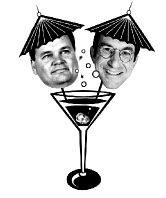THE RACE for mayor is not an even contest.
King County Council member Greg Nickels enjoys tremendous advantages over City Attorney Mark Sidran. The latest KING 5 poll showed Nickels with a whopping 10-point lead over Sidran (50 percent to 40 percent), but that doesn’t mean Nickels can stroll across the finish line. Sidran has proven he is a smart, tough, wealthy competitor, although his caustic conservatism will have a hard time building a majority in a city that loves bland liberals like Nickels.
PRIMARY RESULTS
This may not be apparent from a quick look at the primary election results, in which Sidran led by 700 votes at press time (the final tabulation is Oct. 1). But primaries are very different beasts from general elections. Conservative voters over 60 make up a higher proportion of the total vote in a primary, while general elections are dominated by younger, more liberal voters, a situation favoring Nickels.
In addition, the terrorism of Sept. 11 pushed this year’s primary in a more conservative direction. Election officials expected to receive 40,000 absentee ballots on election night but had only half that many because mail delivery had been slowed by the national tragedy. In the political biz, the ballots that arrived are known as “early absentees,” and they tend to be especially conservative. Not surprisingly, Sidran did very well with these voters, capturing 37 percent of them to Nickels’ 24 percent. As the votes came in from the polls, Nickels kept gaining on Sidran.
AIR WAR VS. GROUND WAR
The primary featured a classic air war versus ground war scenario. Sidran started bombing the TV airwaves with ads on Aug. 27. That means the early absentees voted while Nickels was focused on winning the ground support of Democrats and labor unions, before he had started any direct mail, TV, or radio advertising. Nickels was going to add a TV campaign of his own, but the terrorist attacks pushed him off the air. This is unlikely to happen before the general election. In November, Nickels will have a substantial get-out-the-vote effort led by Democrats, labor, and environmentalists, plus a sophisticated advertising campaign. Sidran will only have the latter because there are no grassroots networks in Seattle for him to tap into.
ISSUES
Sidran has announced his intention to stick with a single-issue, negative campaign focusing on Sound Transit’s light rail. That will make it difficult for him to broaden his appeal and reach out to Seattle’s political center. While Sound Transit has become hated by Seattle’s chattering class and segments of the downtown business community, there’s hardly any indication a majority of ordinary Seattle voters want to abandon light rail, much less despise it so thoroughly that they’ll base their vote for mayor on it. Sidran is smart enough to figure this out, so look for him to add an image dimension to his campaign—the we-need-a-strong-leader-in-troubled-times rap.
Nickels ran entirely on image in the primary—the nice-neighbor-from-West-Seattle shtick. He too seems disinclined to depart from this strategy. If Nickels refuses to push any issues whatsoever, it will give Sidran an opening. On a wide array of issues from environmental stewardship, to social services, to transportation solutions other than light rail, to race relations, Nickels’ positions and record favor him enormously over the law-and-order city attorney. He might need to exploit that advantage if he wants to win.
MONEY
Sidran’s personal wealth is a big advantage. He already loaned his own campaign $100,000, enabling him to start his TV ads two weeks before Nickels. Sidran shouldn’t hesitate to get back on the air and keep hammering away while Nickels dials for dollars.
Nickels can use the money issue against Sidran by crafting a populist message: “I’m just an ordinary guy who can’t throw money around, but my opponent is a multimillionaire who wants to buy this election.” It’s a message that will resonate in Seattle, and one that Nickels didn’t hesitate to use against Paul Schell in 1997. Nickels also has a good fund-raising network, which will allow him to stay competitive with Sidran, although his dialing finger will be awfully tired by November.
THE ESTABLISHMENT
For the first time in many mayoral elections, there is a significant split in Seattle’s grand ruling coalition. For years, labor unions, Democrats, environmentalists, the daily newspapers’ editorial boards, and the business community all walked in lockstep behind a single mayoral candidate in the general election—be it Paul Schell or Norm Rice. Now that coalition has fractured, with the would-be kingmakers at the Times and P-I and parts of the downtown business community backing Sidran because of his opposition to light rail and his willingness to clean up the riff-raff. These folks can help Sidran, both with their pocketbooks and their soapboxes. Nickels still has significant business support that he needs to highlight. His campaign should also probe the daily columnists who are not part of the editorial pages to see if he can generate some favorable free publicity.








